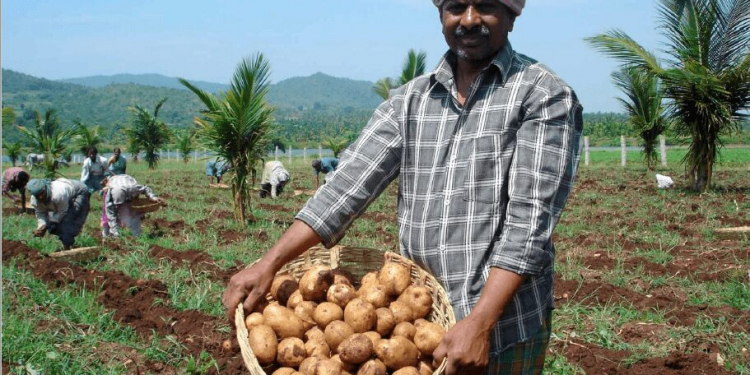This is the cold desert of the landlocked Lahaul Valley in Himachal Pradesh where you won’t drop the idea of trade as its disease-free potatoes are virtually selling like hotcakes despite the Covid-19 pandemic.
The crop this time is nearly double than the previous year and the farmers are getting the remunerative prices, too.
Tucked in the Himalayas close to the India-China border the arid Lahaul Valley which bears a single crop in a year through glacial-fed streams has almost managed to keep the coronavirus at bay.
At present the harvesting of potatoes is nearly over and its transportation for marketing is underway.
The Lahaul valley once the hub for producing bitter taste hops is known for growing prized seed potatoes whose history goes back to 1854 when missionary A.W. Hide from Germany established a farm near Keylong, the district headquarters town nearly 350 km from the state capital Shimla.
The valley dotted with tiny hamlets produces the country’s pest-resistant seed varieties — Kufri Chandramukhi and Kufri Jyoti — and ‘Table Santana’ and ‘Shafordi’ varieties that are used for making chips.
Every year a huge chunk of potatoes from the valley finds its way to the markets in West Bengal, Bihar, Gujarat, Madhya Pradesh, Punjab, Uttarakhand, Uttar Pradesh and north-eastern states where they are used mainly as seeds for crops.
They also find their way to markets in northern India where the rates have been lucrative.
“Half of the land this time, too, was used for contract farming of potatoes for McCain Foods Pvt. Ltd so a large portion of the crop has been sold to the company,” farmer Neeraj Negi told IANS.
He said the prices and the yield were higher this time compared to 2019.
“Our area is known for growing the ‘Kufri Jyoti’ variety of potato owing to river-fed irrigation facilities and high moisture content in soil due to plentiful of snow last winter,” an elated Negi added, who migrates to lower hills along with his family every winter.
“Since private companies are promoting chip-making varieties like ‘Santana’, we are cultivating them on some portion while the remaining land is used for cultivating the traditional variety,” he said.
His village along the Manali-Leh national highway falls in Koksar panchayat that lies along the mighty Chandra river which freezes in winter.
Another farmer Deepak Bodh said besides McCain Foods Pvt Ltd., the other companies that are promoting contract farming are Hyfun Frozen Foods and Balaji Foods.
A bag of 50 kg of ‘Santana’ is sold at a price of Rs 1,200-1,300. In 2019 it cost Rs 1,000 on an average, he added.
“Nearly half of the crop has been sold out to the private companies, the rest will reach the markets through our cooperative society,” Bodh said.
As per state Agriculture department estimates, the Lahaul valley is expected to harvest nearly 35,000-40,000 bags of 50 kg each largely of ‘Kufri Chandramukhi’ and ‘Kufri Jyoti’ varieties cultivated over 750 hectares.
Prem Lal, Managing Director (MD), Lahaul Seed Potato Growers Cooperative Marketing Ltd, told IANS that they are procuring the potatoes from growers directly.
“After procuring, we will be transporting the entire crop for grading to Kullu town. By the end of October, we will start marketing the produce after fixing its price with the government,” he said.
With 2,054 members, the society founded in the early 1960s handles the marketing of the entire produce of seed potato from the Lahaul valley in the open market.
Coupled with marketing pangs amid the coronavirus pandemic, this season, however, turns out to be a blessing in disguise for farmers who say the crop prices remain at a sweet high.
Though the overall production of both varieties ‘Kufri Chandramukhi’ and ‘Kufri Jyoti’ was nearly double this time, prices are also double than the previous year, Lal added.
The society is expected to market 10,000-12,000 bags of 50 kg each of ‘Kufri Chandramukhi’ and 15,000 bags of ‘Kufri Jyoti’.
“This time the demand is good both for food and seed,” he said.
Prime Minister Narendra Modi after inaugurating the Atal Tunnel, the all-weather road link between Manali and the Lahaul valley, earlier this month said now the crop of cauliflower, potato and peas will reach the markets quickly.
“Chandramukhi potato which is the identity of Lahaul and I have also tasted it will get new markets and new buyers. Now like new vegetables and new crops, the trend in this sector will grow rapidly,” Modi said during a public address at Sissu on October 3.
Lahaul-Spiti is also a great producer of medicinal plants and hundreds of herbs and many spices like ‘Asafoetida’, ‘akuth’, black cumin seeds, saffron and ‘patisha’. These products can become the identity of Lahaul-Spiti in Himachal and India in the world.
“In the last two to three years, the potato yield had come down by 25 to 30 per cent. This year it’s bumper,” added farmer Vijay Bodh at Pattan village.
He also said the area has been flushing with vegetables mainly the high-value exotic broccoli and lettuce.
Agriculture experts say the remote valley which has a cultivation season for less than five months from May has been turning into the vegetable bowl as returns are more than double.
The Lahaul Valley comprises more than two dozen small and scattered villages.
The other cash crops of the valley are apple, pear, apricot, almond and plum.







